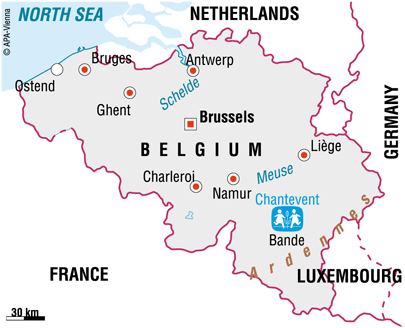
Vi er i Belgium
Some facts about Belgium
The population of Belgium is 10.4 million (UN 2011 est.), of which 97 per cent live in urban centres. The capital city of Brussels is the biggest city with around a million inhabitants.
Belgium is divided linguistically, with the two main groups being the Dutch speakers called Flemings and the French speakers called Walloons. Flemish is the official language in Flanders, while French is official in the south. Brussels is bilingual, and German is spoken in a small section of the Liege province in eastern Belgium.
Belgium was one of the founding members of the European Union and adopted the euro as currency in 2002. Brussels hosts many international organisations including the headquarters of the European Union (EU) and the North Atlantic Treaty Organisation (NATO).
Not everyone benefits from the country's high living standard
Belgium has a very strong economy and the gross domestic product has grown in recent years. The unemployment rate is 8.5 per cent (2010 est.). The economy relies mainly on services, transportation, trade, and manufacturing. 73 per cent of the population is employed in services, 25 per cent in industry and only two per cent in agriculture.
Belgium takes full advantage of its geographical position: payment received for the use of its developed road and rail networks and sea ports provides an important source of income. In addition, three quarters of its trade is with its neighbouring European Union countries.
Most Belgians enjoy an excellent standard of living, which includes a high life expectancy and good access to a well-funded health service. However, there is a high number of people at risk of poverty – nearly 15 per cent of the population is living on an income that is 60 per cent lower than the national median.
Due to the rapid rate of economic growth in the 1960s and 1970s Belgium recruited workers from other countries. Many of these people stayed in Belgium and their children have been born and educated there. At present ethnic minorities include people from Italy, Morocco, Turkey, Spain, Algeria, Portugal and the Democratic Republic of the Congo. Ethnic minorities are disproportionately affected by poverty: more than fifty per cent of people of Moroccan and Turkish origin live below the poverty line. These groups also suffer higher unemployment rates and are more likely to suffer from poor health.
Violence against women and minorities has been recognised as a problem in Belgium. In addition, Belgium is a transit and destination country for trafficked women and children who face sexual and economic exploitation. In spite of the introduction of legislative measures, the number of cases is increasing, especially the number of sexually exploited children under the age of 18.
Situation of the children in Belgium
The rights of children are, on the whole, well protected in Belgium. In the year 2000 the Constitution was amended to include a clause protecting children’s moral, physical and sexual integrity.
Belgian children have access to one of the best educational systems in Europe: according to the Programme for International Student Assessment (PISA), Belgium’s educational standard is significantly higher than the OECD average. Education is compulsory between the ages of 6 and 18 and a very high proportion of students continue into postsecondary education.
In general terms, Belgium has a low child poverty rate, in part because of the social welfare programmes to help families. Certain groups are particularly vulnerable to discrimination and poverty: these include people from ethnic minority backgrounds (30 per cent of these children are at risk of poverty), families where parents are either unemployed or have unstable jobs, and single parent households. The latter are twice more likely to experience poverty than those in households with two parents.
SOS Children's Villages in Belgium
At present "SOS Villages d'Enfants Belgique", works with children and their families in Belgium, and runs a variety of programmes in two locations. In addition to the SOS Children's Village, there is a youth programme and two social centres. The young people living in the SOS flats can learn to live independently while they complete their schooling or vocational training. The activities of the social centres vary according to the local needs: in Bande, The SOS Social Centre runs a child day-care centre allowing parents to attend training or go to work. The social centre in Liedekerke provides short-term care while a more permanent solution is found for children who are at risk.
The second association "SOS Villages d'Enfants Belgique pour le monde" supports projects outside Belgium. For example, it has supported the creation of a training centre in Kigali, Rwanda, and the SOS Children's Village in Hyderabad in India.
Website of SOS Children's Villages Belgium
(available in French and Dutch)